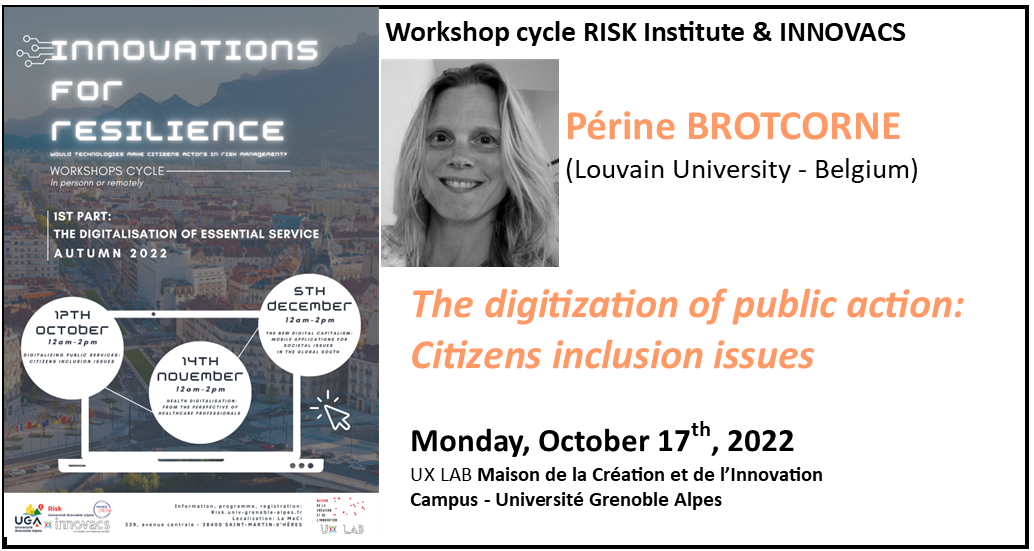- Imprimer
- Partager
- Partager sur Facebook
- Partager sur X
- Partager sur LinkedIn
Atelier, Rencontre / Débat / Événement en français, Innovation, Innovations pour la Résilience, Partenariats, Recherche
Le 17 octobre 2022
Saint-Martin-d'Hères - Domaine universitaire

The digitization of public action - Citizens’ inclusion issues
1ST PART OF THE CYCLE: THE DIGITALISATION OF ESSENTIAL SERVICES
WORKSHOP #1 - OCTOBER 17TH, 2022
Language: French - English Material
Research paper’s abstract
Research on digital inequalities has generally focused on the uses and users of digital technologies, particularly connected computing. On the other hand, few of them have understood this phenomenon through the prism of service providers by questioning the influence of digitization policies on shaping more or less inclusive and empowering digital devices. This article, therefore, aims to analyze the process of "technologicalization" of institutional choices relating to the dematerialization of services in two organizations of general interest in Belgium. It focuses on a particular aspect of design work, which relates to the modalities of involvement of the user's perspectives during the development stage. Overall, the results reveal how certain users are excluded and how weak any form of empowerment remains for those who are taken into account.
Full paper
Video: The digitization of public action - Citizens’ inclusion issues
---
Workshop Cycles 2022-2023 - Full program
1st part of the cycle: The digitalisation of essential services
. October 17th, 2022
The digitization of public action / Citizens inclusion issues
Périne BROTCORNE, (Louvain University, Belgium)
(FR - English Material)
. November 14th, 2022
Health digitalization: From the perspective of healthcare professionals
Marie BERTHOUD (Lille University, France)
(FR - English Material)
. December 5th, 2022
Mobile (for) development : when digital giants take care of the poor.
Marine AL DAHDAH (CNRS, CEMS, French Institute of Pondichery-India)
(English)
2nd part of the cycle: Involving users? New trends in design methodologies
. Is frugal innovation more inclusive ?
. Simulations, experimentations, serious games and living labs: enrolling and observing vulnerable users.
. Low-techs, citizen innovations and the commons.
(Detailed program coming soon)
3rd Part of the cycle: Innovations, vulnerabilities and territories
. Thermalism, vulnerability and territories
Adrien SONNET (LACES Lab., Bordeaux University)
(FR - English Material)
. Innovations for vulnerable territories: sustainable development as an opportunity for new patterns?
Nicolas BUCLET (PACTE Lab., Grenoble University)
(English)
Workshops cycle conclusive conference
Gérald GAGLIO (sociologist of innovations)
(English)
RISK INSTITUTE: THE “INNOVATIONS FOR RESILIENCE” CLUSTER OBJECT
Coordination: Jean-Luc Bosson (TIMC-Imag), Jean-François Boujut (G-Scop), Céline Cholez (PACTE)
The cluster Innovations for resilience is a multi-disciplinary research group (sociologists, geographers, historians, engineers, climatologists and geo-scientists, hydrologists, architects, physicians, managers, communicators...) involved in undesrtanding the spreading of "people-centered innovations" to make them actors of crisis management and enhance their resilience.
Actually, in a few years, many “smart” innovations explicitly dedicated to different types of crises management or vulnerabilities reduction have been developed by public and private players worldwide in order to integrate public concerned or recognized as concerned. The cluster research mainly tackles smart, decentralized, often small, and “easy-to-use” innovations that for some, benefit from the recent progress of microelectronics and digital industries, from the trend of artificial intelligence and the internet of things. This contributes to widespread agile and economical solutions (small sensors, mobile apps, for example) that, coupled with institutional innovations, are expected to complete or replace institutional and experts centered traditional responses.
Many of these innovations originate in a public-private partnership; they concern many different geographical and political territories; some are market-driven, some are “bottom-up” (emerging from a grass-root innovation process). The public concerned, the “end-user,” can both appear as a target and a producer of information (Al Dahdah, 2019), sometimes through a community commitment but also as a human virtual or physical sensor (Goodchild, 2007).
A significant issue the cluster addresses is analyzing the extent to which these innovations drive a change in the risks’ governance with a more inclusive perspective.The cluster’s program mainly addresses issues related to:
- change in design methodologies (users’ centered, frugal, grass-roots innovation) at all stages from idea to prolonged usage with a challenge about the integration of learning from crisis and vulnerability experiences approaches (as recommended in risk cycle management) and long and ordinary existing practices regarding risk phenomenons;
- legal and public policy dimensions especially privacy regarding data capture, responsibilities’ transfer, and insurance regime implications, market regulations for public stakes (health, natural and industrial risks) and sustainable economic model;
- change in risks’ expertise role, in experts’ position and capacities of action confronted to the emergence of new actors and possible change in institutional and power relations.
The cluster Innovations for resilience lead research projetcs (master, phd, seniors researchers), in partnerships with different territories, foster new partenerships and provides scientific animation on these topics toward Grenoble research communities but also internationally: Kyoto University-Japan, Swansea University-Wales, Denver Colorado University (USA), the International Center for Frugal Innovation (Delft, Leiden et Rotterdam Universities, Nederland).
SFR INNOVACS
THE RESEARCH FEDERATION "INNOVATION, KNOWLEDGE, SOCIETY"
UNIVERSITÉ GRENOBLE ALPES, CNRS, GRENOBLE INP
& CLUSTER INNOVATIONS FOR RESILIENCE - RISK INSTITUTE
UNIVERSITÉ GRENOBLE ALPES
THE OBJECTIVE OF THIS OCTOBER SESSION IS TO ADDRESS THE ISSUE OF CITIZENS’ ACCESS TO PUBLIC SERVICES IN A CONTEXT OF A LARGE PUBLIC ACTION DIGITALIZATION PROCESS.
PÉRINE BROTCORNE (LOUVAIN UNIVERSITY, BELGIUM) WILL PRESENT THE PAPER SHE WROTE WITH CAROLE BONNETIER & PATRICIA VENDRAMIN: “A DIGITIZATION OF SERVICES OF GENERAL INTEREST THAT STRUGGLES TO INCLUDE AND EMANCIPATE ALL USERS” (TERMINAL-TECHNOLOGIE DE L’INFORMATION, CULTURE ET SOCIÉTÉ, 2019).
Date
12:15 AM - 1:45 PM
Localisation
Saint-Martin-d'Hères - Domaine universitaire
Location
Maison de la Création et de l’Innovation
UX LAB - Room 008
339 Av. Centrale
38400 Saint-Martin-d'Hères
Access
Tramway B & C - Station Gabriel Fauré
- Imprimer
- Partager
- Partager sur Facebook
- Partager sur X
- Partager sur LinkedIn
